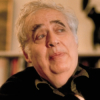Harold Bloom

Harold Bloom
Harold Bloomis an American literary critic and Sterling Professor of Humanities at Yale University. Since the publication of his first book in 1959, Bloom has written more than 20 books of literary criticism, several books discussing religion, and a novel. He has edited hundreds of anthologies concerning numerous literary and philosophical figures for the Chelsea House publishing firm. Bloom's books have been translated into more than 40 languages...
NationalityAmerican
ProfessionTeacher
Date of Birth11 July 1930
CountryUnited States of America
I realized early on that the academy and the literary world alike
Everyone wants a prodigy to fail; it makes our mediocrity more bearable.
Real reading is a lonely activity.
I think Freud is about contamination, but I think that is something he learned from Shakespeare, because Shakespeare is about nothing but contamination, you might say.
I take it that a successful therapy is an oxymoron.
I would say that there is no future for literary studies as such in the United States.
In fact, it is Shakespeare who gives us the map of the mind. It is Shakespeare who invents Freudian Psychology. Freud finds ways of translating it into supposedly analytical vocabulary.
Information is endlessly available to us; where shall wisdom be found?
More even than Southern Presbyterians and Southern Methodists, the Baptists provided the great mass of Confederate enlisted men.
What is supposed to be the very essence of Judaism - which is the notion that it is by study that you make yourself a holy people - is nowhere present in Hebrew tradition before the end of the first or the beginning of the second century of the Common Era.
What I think I have in common with the school of deconstruction is the mode of negative thinking or negative awareness, in the technical, philosophical sense of the negative, but which comes to me through negative theology.
We read not only because we cannot know enough people, but because friendship is so vulnerable, so likely to diminish or disappear, overcome by space, time, imperfect sympathies, and all the sorrows of familial and passional life.
Literature is achieved anxiety.
Not a moment passes these days without fresh rushes of academic lemmings off the cliffs they proclaim the political responsibilities of the critic, but eventually all this moralizing will subside.